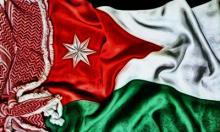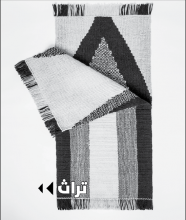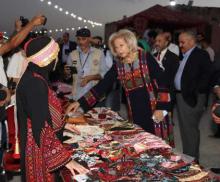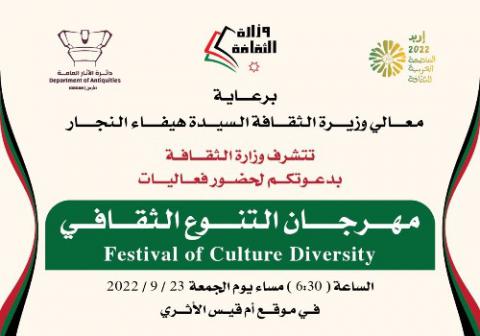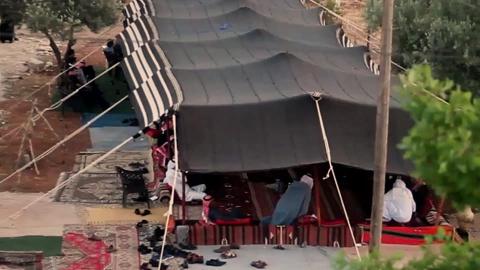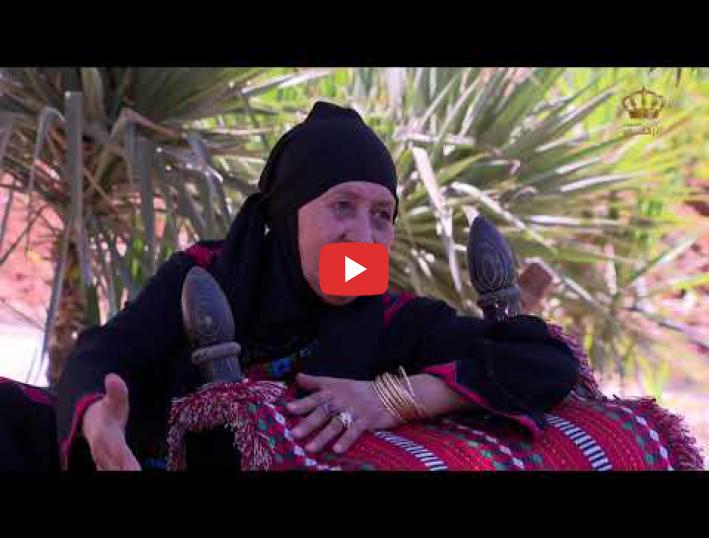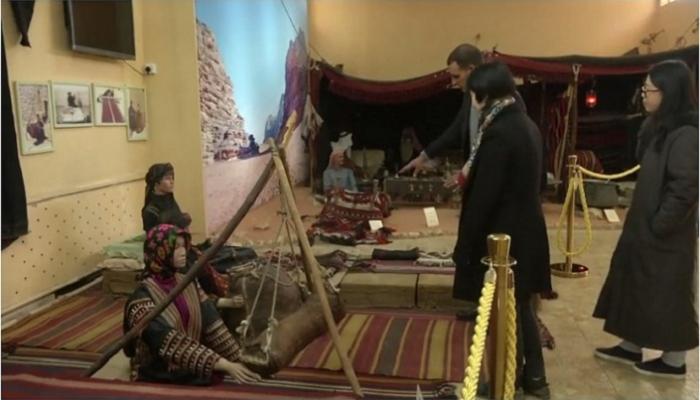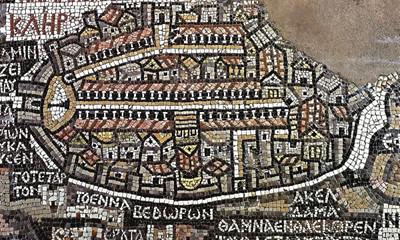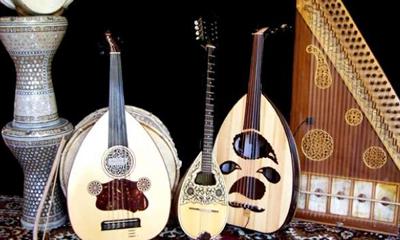- الرئيسية
- مديرية التراث
- نبذه عن المديرية
المزيدأولاً: نشأة المديرية تم تأسيس مديرية التراث في نهاية عام 2010 وذلك حرصاً من وزارة الثقافة على رعاية وصون التراث الثقافي غير المادي في المملكة الاردنية الهاشمية. «التراث الثقافي غير المادي » الممارسات والتصورات وأشكال التعبير والمعارف والمهارات - وما يرتبط بها من آلات وقطع ومصنوعات وأماكن ثقافية...
- أهداف مديرية التراث
- اقسام المديرية
المزيدأقسام مديرية التراث: 1- قسم البرامج التراثية : من أبرز مهامه تنظيم وتنفيذ ومتابعة المشاريع والبرامج والأنشطة المتعلقة بالتراث الثقافي غير المادي ضمن خطة المديرية والجهات ذات العلاقة، ومتابعة الاتفاقيات التي تعقدها المملكة مع المنظمات والهيئات الدولية لغايات تنفيذ المشاريع التي تقع ضمن نطاقها. 2...
- الاصدارات المزيد
- التعليمات والاتفاقيات المزيد
- نبذه عن المديرية
المزيد
- المشاريع
- مشروع المكنز الوطني
المزيداختصاصات لجنة ذاكرة العالم الأردنية الاسم: Jordanian Memory of the World committee اللجنة الأردنية لذاكرة العالم الهيكل: تتألف لجنة ذاكرة العالم الأردنية من لجنة رفيعة المستوى و 4 لجان فرعية متخصصة في مختلف جوانب اللجنة. الوظيفة: ستضطلع لجنة ذاكرة العالم في الأردن بمسؤولية...
- المشروع الوطني لحصر التراث
المزيدنبذة عن المشروع يهدف هذا المشروع إلى حصر التراث الثقافي غير المادي في كافة محافظات المملكة الأردنية الهاشمية، وبالتزامن. كما يهدف إلى إشراك المجتمع المحلي في الجرد، وإنشاء قاعدة بيانات شاملة، وتحديد عناصر التراث الثقافي غير المادي المهدّدة بالانقراض، ورفع الوعي بأهمية التراث الثقافي غير المادي حتى...
- مشروع تفريغ و أرشفة أشرطة الكاسيت المسجلة في أواسط السبعينيات
المزيدمشروع إعادة تأهيل المادة الصوتية المسجّلة في السبعينيات من القرن الماضي. (الذاكرة المسجّلة في أشرطة الكاسيت التقليدية) للحفاظ على الموروث الأردني الثقافي، والكنز الذي قامت بتسجيله نخبة من الباحثين في التراث في أواسط السبعينيات، وفي مناطق مختلفة من المملكة، ارتأت مديرية التراث أن يصار إلى البحث عن...
- برنامج ذاكرة العالم
المزيداختصاصات لجنة ذاكرة العالم الأردنية الاسم: Jordanian Memory of the World committee اللجنة الأردنية لذاكرة العالم الهيكل: تتألف لجنة ذاكرة العالم الأردنية من لجنة رفيعة المستوى و 4 لجان فرعية متخصصة في مختلف جوانب اللجنة. الوظيفة: ستضطلع لجنة ذاكرة العالم في الأردن بمسؤولية...
- مشاريع مدن الثقافة
المزيد
المشاريع
تم تخصيص جزء من مخصصات مدن الثقافة والالوية في الاعوام السابقة لدعم مشاريع تراثية تُعنى في الحفاظ على الموروث الشعبي الاردني وتسويق المنتج التراثي ودعم الافراد والجمعيات والفرق التراثية. حيث قامت مديرية التراث بالتنسيب بدعم المشاريع التي تحقق روية ورسالة المديرية وتسلط الضوء على المنتج التراثي... - مهرجان التنوع الثقافي
المزيد
المشاريع
يأتي ضمن احتفالات العالم باليوم العالمي للتنوع الثقافي الذي يصادف 16/5 من كل عام، ويهدف هذا المهرجان إلى الحفاظ على النسيج الاجتماعي الاردني وتعزيز الترابط بين كافة أفراد المجتمع الأردني وإبراز نسيج الحضارة الأردنية وجماليات التنوع الثقافي في الأردن والتعريف بالهوية الثقافية المتميزة لدى الأردن... - ترشيح العناصر على قوائم التراث الثقافي غير المادي
المزيد
المشاريع
بعد ان يتم حصر عناصر التراث الثقافي غير المادي في المملكة وادراجها على قوائم الحصر لدى مديرية التراث، تقوم المديرية وبالتنسيق مع مؤسسات المجتمع المدني بترشيح عناصر مختارة على قوائم اليونسكو للتراث غير المادي. إن ترشيح عنصر واحد على قوائم التراث سواء كان ملف وطني أو مشترك يستغرق عامين ويتطلب تحضير... - العناصر الاردنية المدرجة على قوائم اليونسكو
المزيد
المشاريع
تم ترشيح ملف (العادات والتقاليد والممارسات المتعلقة برقصة السامر) في الاردن على القائمة التمثيلية للتراث الثقافي غير المادي للإنسانية، وستعلن نتائج الترشيح خلال شهر تشرين الثاني من العام 2018. ترشيح ملف النخلة والعادات والطقوس المرتبطة بها: تراثاً عربياً مشتركاً على القائمة التمثيلية للتراث...
- مشروع المكنز الوطني
المزيد
- المركز الإعلامي
- قواعد البيانات
- قاعدة بيانات المكنز الوطني
المزيد
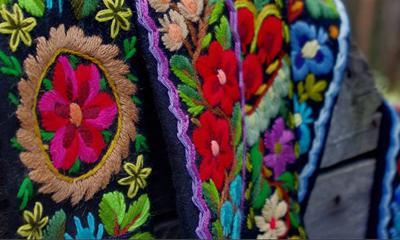
- قوائم الحصر الوطني
المزيد
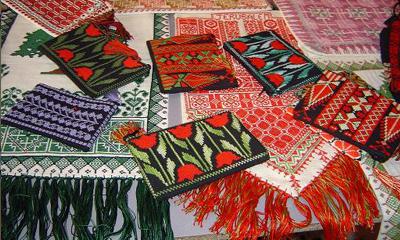
- قاعدة بيانات الحرفيين
المزيد
قاعدة بيانات الحرفيين
- قاعدة بيانات المكنز الوطني
المزيد

المنسف الأردني Jordanian Mansaf
التصنيف:
- التقاليد وأشكال التعبير الشفهي بما في ذلك اللغة
- التقاليد
- تقاليد الطعام
- الاكلات الشعبية
المحافظة:
الشرح:
|
المنسف الأردني: هو وجبة من الوجبات الرئيسية خاصة في الأفراح والأتراح والمناسبات العامة. مكوناته قديما كانت مما يتوفر من المواد الموجودة في البيت مثل: اللحم، اللبن وكانوا يستخدمون بدلا من الرز برغل. بعد دخول الرز البلدي حل الرز مكان البرغل في المنسف الاردني، وكان يوضع تحت الرز عدد من أرغفة الشراك وعلى وجه المنسف (أعلاه). يتم تنظيف اللحمة بعد تقطيعها وبنظفوا الراس لأنه الراس يعطي أهمية للمنسف(بمعنى ذبحنا ذبيحة ما اشترينا لحم) وهذا يدل على اكرام المعزب. بنغلي اللبن وبنضل نحرك باللبن حتى ما يفرط لما يغلي، بعدين بنحط اللحم باللبن وبنتركه حتى يغلي اللبن وتستوي اللحمة. الرز بكون استوى بفرد الشراك (السدر)، نضع الرز على شكل (قبه) وبنوزع اللحم عليه بعد ما يحطو الراس على راس السدر يفتح فم الذبيحة والبعض يضع البقدونس داخل فم الذبيحة ليكون المنظر اجمل. ثم نقلي الصنوبر ونرش منه على سدر المنسف على ( المواكل). يدخل الشباب حاملين سدور المناسف وتوضع امام الضيوف ويقوم واحد منهم بصب (اللبان) الشراب، اللبن) من الكفكير على السدور (المواكل). وبعد ما يخلص من وضع الشراب يقول المعزب (من اقوله) (كل الساعات مباركة وهذه ابرك ساعة)، (تفضلوا على ما قسم الله)، (وجيرة الله والنبي لا تخلوا ليكو خاطر بالزاد) ( يا هلا ويا مرحبا بالضيوف). ويقوم الضيوف قبل الاكل بغسل ايديهم والوقوف حول السدر وبستنى كبيرهم حتى يبدأ ( يبلش) بالاكل يمد يده احتراماً له وللضيوف حتى يبدأو بالأكل. طريقة الاكل: الاكل باليد اليمنى واليد اليسرى خلف الضهر وبندحبر الرز بثلاث اصابع (الشاهد، والوسطى، والابهام). الذين هم حول السدر اذا لم يوجد معزب على السدر بكرموا بعضهم بعض بفت اللحم باليد اليسرى. وعادةً لا يمد احد يده على اللسان اذا وجد هناك شاعر على السدر فالشاعر اولى شخص بلسان الذبيحة. وكثير من الضيوف بحسبوا حساب اهل البيت بتركوا قطعة او ثنتين من دون ما حدا يلمسهم . والي بشبع بالأول لازم يبين حالو بيكمل اكل عشان ما يحييو الي بوكلوا بالحرج المعزب بالعادة ما بيوكل مع الضيوف عشان ما يحسو بالحرج بالعادة بيمسك الكفكير بايده عشان يزود شراب ع السدور اللي بي
المناسبات التي يقدم فيها المنسف: الافراح: كانوا زمان يعزموا للعرس وغالباً تكون العزومة يوم الجمة، بقدموا المنسف بعد صلاه الجمعة ويقف العريس ليودع الناس ( الضيوف) الي بدورهم بعطوه النقوط. كانت العادة ان الضيوف كانوا يجيبوا معهم شوالات الرز والسكر او ذبايح مع مكاليفها.
العزاء: كانوا يقدموا المنسف لقرايب المتوفى ( الدانيين: أي المقربين واصدقائهم ومعارفهم) يروحوا أهل الميت الى بيوت هؤلاء الاقارب ليتناولو الطعام ثم يقوم أهل البيت بعمل السبوعية (وهي مناسف لكل من عزمهم وكذلك لبعض الاصدقاء والاقارب).
الطهور: تقدم المناسف عندما يطهر الاب ابنه وكانوا غالبا ما يجمعوا ابناء القرايب الي في سن الطهور ويعملوا لهم غداء مشترك.
الزيارات: عند مرمر الضيوف كانوا يقدمون المنسف لهم.d
نَزليّة: عندما يرحل شخص ويسكن بجانب شخص أو مجموعة، على الأشخاص أن يقوموا بعمل نَزليّة له بالدور (مناسف ع الدور) وهو آخر واحد بعمل غداء لكل من عزمه. |
Jordanian al-Mansaf: The ceremonial meal served on occasions of joy and sorrow, and on all occasions. In old times, its ingredients were household items, such as meat, and yoghurt; bulgur was used instead of rice. After the introduction of rice, it replaced bulgur in making Jordanian al-Mansaf. Beneath the rice, several loaves of Shirak bread are tucked, and few on top covering it. Once the meant is clean and cut, the head is prepared. The head is important. It signifies the host slaughtered one of their own animals, symbolic of generosity. We boil the yoghurt and mix it, so it won’t spoil. Then we add the meat to the yoghurt, and we leave to simmer until the meat is done. By that time, the rice will have been done. I spread the Shirak, and put the rice in the shape of dome. We spread the meat on top of it, and when the place the head, we open the mouth. We stuff the mouth with parsley to make it more presentable. We fry pine nuts, and spread them on al-Mansaf platter—“al-Mawakel”. Young men carry al-Mansaf platters to the guests, and one of them (al-Labaan) pours yoghurt (broth) using a ladle on the platters (al-Mawakel). Once that is done, the host says, “all hours are blessed, but this one is blessed the most”, or “come to what God has given”, or “by God and the Prophet, eat your fill”, or “greetings and welcome my guests”.
In the past, people prepared a feast that often occurs on Friday. Al-Mansaf was served after the Friday Prayer and as the groom stood to see the guests off, the guests on their part gave him money as a wedding present. The custom had it that the guests should bring rice and sugar sacks with them, or the slaughter animals along with ingredients necessary for their cooking.
Circumcision Al-Mansaf is served when a father circumcises his son. Relatives usually gathered all of their sons who are in a circumcision age and held a common feast.
Visits Whenever guests arrived, al-Mansaf was served.
Welcoming Feast When someone moved to live next to someone or some group, that someone or group held a welcoming feasts ‘nazeleh’, taking turns inviting him. The newcomer held the last feast, inviting all of those who invited him. |
| المرفق | الحجم |
|---|---|
| 649.24 كيلوبايت |


